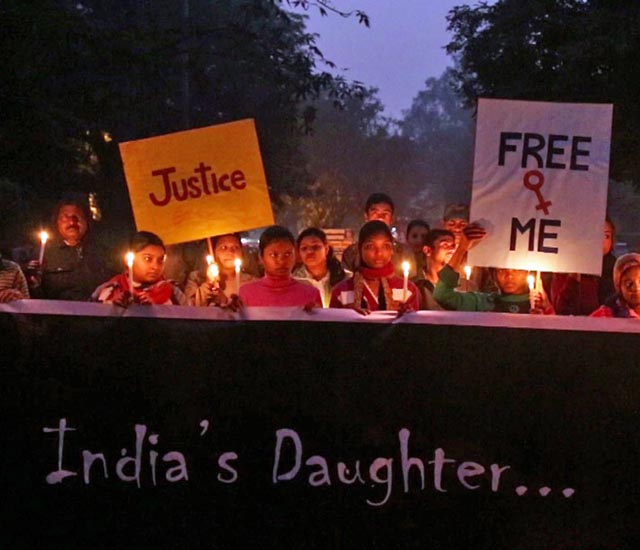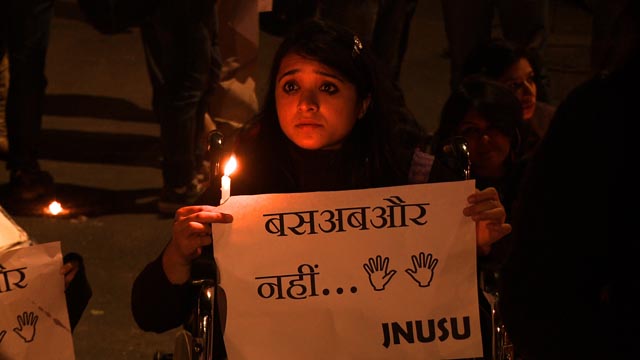
India’s Daughter – Banned – But Still Seen
‘India’s Daughter’ is banned in India but Jyoti Singh’s story cannot be put under wraps, it cannot be muzzled. It is all over social media, and it needs to be seen and seen by a lot of people, especially the gatekeepers of patriarchy.
What happened in Delhi on 16 December 2012 has come back to haunt people, and to see that justice gets done. It is said that a woman is raped in India every 20 minutes and the time is not for complacency. To those who say the documentary ‘India’s Daughter’ should be banned, there is only one thing to say – watch it and then decide.
I watched the film this morning and felt the sadness, the anger we all felt when this young medical student was gang-raped by six men on a moving bus and then beaten and stripped naked and thrown out into the dark streets by the assailants.
I watched this film reluctantly for who wants to relive a nightmare?
India’s Daughter – the BBC documentary – The film has been removed from Youtube internationally. Here is a short clip of the film.
In the second video, Kirron Kher talks in Parliament about the ban of the film.
Post-Nirbhaya: A Girl Named Jyoti Singh
In the film you meet Jyoti’s parents and learn about her dreams. You learn that her parents distributed sweets when she was born even though relatives mocked, ‘You’re celebrating as if it’s a boy!” These loving supportive parents even sold their ancestral land so that they could send her for a medical education. Family members asked, “Why are you selling it for a girl?”
You root for Jyoti Singh who took up a call center job in order to pay for the school hostel, working from 8 pm to 4 am besides attending school.
Then the film takes you to Tihar Jail where you meet one of the rapists – Mukesh, driver, 28. He is sentenced to death for rape, unnatural sex and murder yet there is no remorse in those eyes. Well-groomed and well-fed, he shifts the blame back to the victim: “You can’t clap with one hand. It takes two hands to clap. A girl is far more responsible for rape than a boy.” He says very clearly and with total confidence, “Boys and girls are not equal.” The roles are defined, according to him – housework and housekeeping for girls, not roaming in discos and bars. He says, “Only about 20 percent of girls are good.”

The Power of Patriarchy
This powerful film reveals much about patriarchy, about how it colors the attitudes toward both males and females. Mukesh, the rapist, believes it’s a man’s right to rape a woman. “When she was raped, she should not have fought back. She should just be silent.” That’s the way it’s been through generations – keeping quiet and bearing the shame. He thinks none of this would have occurred if she had taken it quietly without a fight.
The most heartening thing about this grim documentary is the power of protests and how thousands of like minded men and women came out to share their anger and despair. They risked police arrest and lathi charges to voice their frustration and take action. Actually Indians can take pride in this show of civic sense and unity of its young generation. Change can only come if the people in power don’t block its path.
Do watch ‘India’s Daughter’ and share. It takes you into the mind of the rapist and shows you how important it is to educate both our boys and girls about equality and the human spirit. It has to begin in the home where the respect for all human life – male and female – has to be inculcated.
Background information on ‘India’s Daughter’
This month India’s government banned the film while the BBC moved their planned broadcast up by days and ignited a new controversy. BAFTA winning filmmaker Leslee Udwin, herself a victim of rape, went to India inspired by the protests against sexual assault. With an all Indian crew, Udwin got exclusive, first time on camera interviews with the rapists and defense attorney, none of whom express remorse. The defense attorney goes even further, stating that “immodest” women deserve what happens to them. An impassioned plea for change, INDIA’S DAUGHTER pays tribute to a remarkable and inspiring young woman and explores the compelling human stories behind the incident and the political ramifications throughout India. But beyond India, the film lays bare the way in which societies and their patriarchal values have spawned such acts of violence globally
“This film does what the politicians should be doing… this documentary’s determination to shed light on the country’s rape crisis should inspire change.”
The Guardian
The film is available from Women Make Movies
Related Links
Interview with director Leslee Udwin on NDTV

11 Comments
It was shocking to hear the utter absurdity spewing from the rapist’s lawyer’s mouths. Can we believe that they actually believe what they are saying? Are they saying that to throw us off the trail? Is it possible that women have no place in Indian society? Are Indian men that infantile in their thinking to believe that women are an unfortunate side effect of life? Disgusting. Disgusting all around. The act that occurred. The thoughts captured and repeated millions of times on film. The banning of the film. The reoccurrence each day of rape in India, for no better reason than a bruised male ego.
Divya, every time the rapist or his defense lawyers open their mouth, it’s a chilling look at how some men still think, and the patriarchal culture they have been brought up in. The only way to change things is to bring up boys and men to think of females as equal and the same – and that’s going to take some doing.
I think that’s correct Veekay – this documentary has initiated a dialogue again and focused on the mindset of the rapists. The ban has only caused the issue to come to the world’s attention.
The disgusting crime of rape happened two years ago. The news travelled from the front page of the daily papers to the back pages, resulting in no or minimal action or reaction. The documentary “India’s daughter” provokes the anger of a society at large that worships Devis in temples but allows two years to pass without questioning the legislators on their inaction.
This documentary’s perfect timing with hard core truth is not easy to take, but certainly the absolute remedy as an eye opener. Congratulations Leslee Udwin.
i thought it was a fab documentary and only feel so sad that it wasn’t shown and got banned in india – a most stupid decision.
Anyone who sees the documentary feels her pain as well as of her parents and the only hatred that increases is towards the defense lawyers and af course the rapist.
Thanks for your input Lavina – how have Indians in the UK reacted to the film?
Roshni, thanks for your comments. If Indian journalists were not given an opportunity to interview the rapist, then the government should not have allowed BBC either. But now that it’s done, it’s good the case is out in the open and people are getting a chance to debate it.
Narender Reddy, I agree that the remarks of the defense lawyers are just horrific – if that is how the average man thinks then we have a long way to go! They should be debarred – there should be no place for such misogynists in the courts.
The atrocities committed were too barbaric and horrific to even comprehend. The attitudes that ensued do not endear you to the “motherland”. All love has been lost.
Initially I wondered why the rapist/murderer got his chance in the spotlight but I realize that what he said is no worse than what so-called educated politicians and lawyers think!
It definitely should not have been banned but clearly the government is ashamed of their handling of the case as well as their ineptitude.
I watched the film on Youtube. I was more horrified with the views of defense Lawyers than with criminal Mukesh’s comments. One defense lawyer said, “We have the best culture – in our culture there is no place for a woman.” I just wonder what his mother, wife and his daughters (if he has any) think of him. The documentary shouldn’t have been banned in India where the disease of rape is so prevalent- rather the movie should have been banned outside India as the media in the West would exploit it to belittle India’s progress in other fields. The defense lawyer’s statements would do more damage to India’s image than criminal Mukesh’s. This documentary is a sure shot for Oscar nomination…..a la ‘Slumdog Millionaire’.